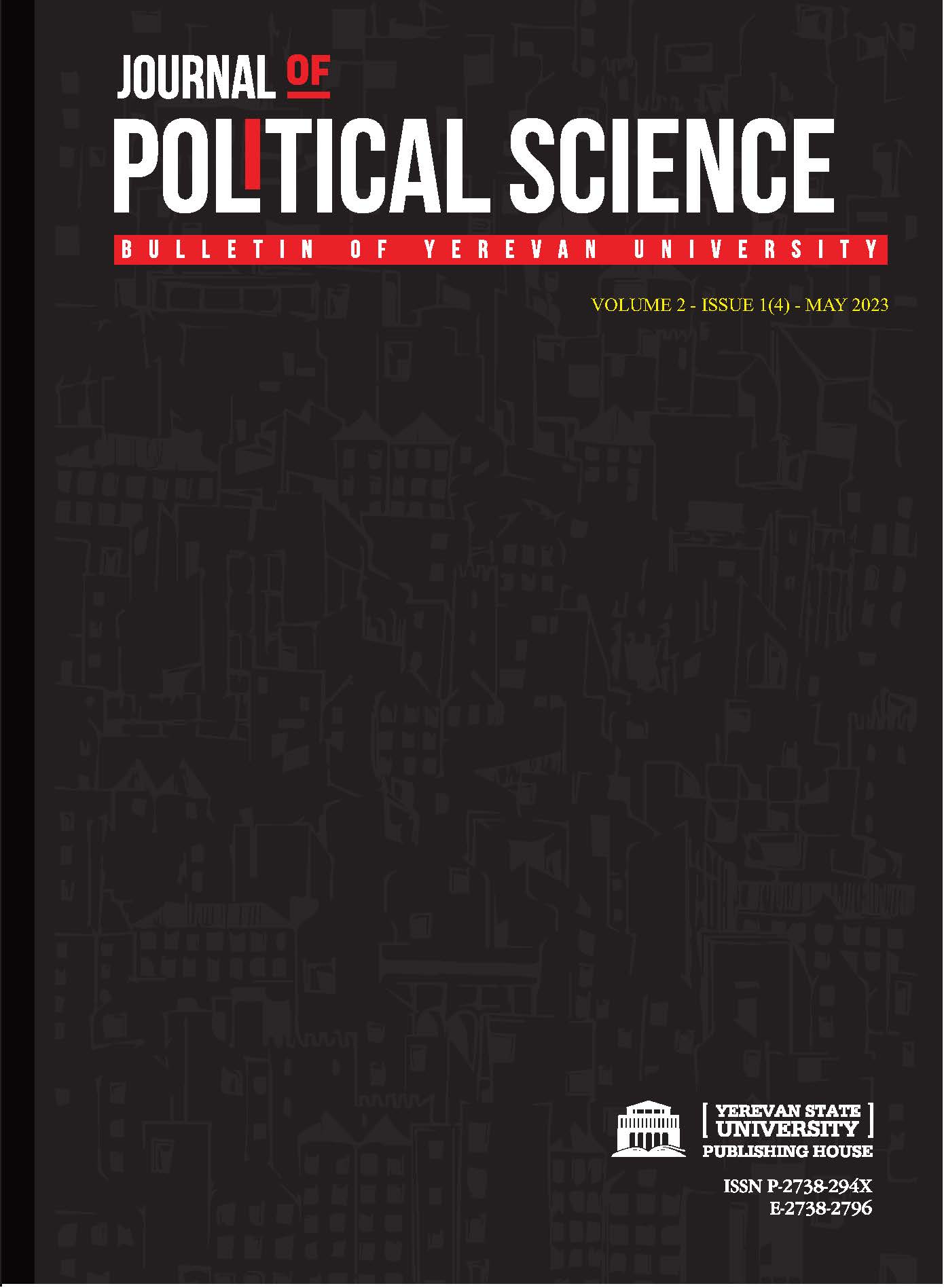The welfare state crisis and the strengthening of the far-right in Sweden as a result of increasing migration
DOI:
https://doi.org/10.46991/JOPS/2023.2.4.117Keywords:
migration, welfare state, far-right, Sweden, migrants, SwedesAbstract
This article attempts to reveal the main causes of the crisis of the welfare state and the rise of the extreme right in Sweden as a result of increased migration. The article clarifies the features of the Swedish model of the welfare state, which essentially became the basis of the Northern European model, which is considered the most complete expression of the essence of the social experiment of the northern countries. Sweden has a reputation for being an extremely open and overly tolerant country towards migrants from different parts of the world. At the height of the migratory crisis, no other country in Europe had received as many asylum seekers in proportion to its population as Sweden. For many left-wing sympathizers, this was confirmation that their state was a true ‘humanitarian superpower’. Unusually generous migration policy has led to a change in the political climate and allowed more radical political forces to emerge. Stereotypes have been disrupted and relatively homogeneous Swedish society is gradually becoming multicultural. There is even a change in the attitude of Swedes themselves towards the entry, integration, permanent residence and naturalization of migrants into Swedish society.
References
Ahmadi, Fereshteh, Mehrdad Darvishpour, Nader Ahmadi, and Irving Palm. 2020. “Diversity barometer: attitude changes in Sweden.ˮ Nordic Social Work Research 10 (1): 21-38, https://doi.org/10.1080/2156857X.2018.1527242.
Bevelander, Pieter, and Nahikari Irastorza. 2016. “The labour market integration of refugees in Sweden.” Nordregio Magazine 16 (3): 12-13.
Borevi, Karin, Kristian Kriegbaum Jensen, and Per Mouritsen. 2017. “The civic turn of immigrant integration policies in the Scandinavian welfare states.” Comparative Migration Studies 5 (9): 1-14. https://doi.org/10.1186/s40878-017-0052-4.
Brunclík, Miloš, Vlastimil Havlík, and Aneta Pinková. 2011. Skandinávie. Proměny politiky v severských zemích (Scandinavia. Transformations of Nordic Politics). Praha: Wolters Kluwer Česká republika.
Corine, Deloy. 2018. “Swedish General Elections: breakthrough expected by rightwing populists.ˮ Fondation Robert Schuman, General Election in Sweden, September 9, 2018. Accessed March 10, 2023. https://www.robert-schuman.eu/en/doc/oee/oee-1771-en.pdf.
Dessimirova, Denitza, Chloé Grondin, and Megan Williams. 2017. “The social and employment situation in Sweden. European parliament: Employment and social affairs.ˮ Accessed March 12, 2023. https://www.europarl.europa.eu/RegData/etudes/BRIE/2017/602064/IPOL_BRI(2017)602064_EN.pdf.
Deutsche Welle. 2018. “Swedish center parties deadlocked as far right sees surge.ˮ October 9, 2018. Accessed March 12, 2023. https://www.dw.com/en/swedens-general-election-results-in-stalemate-as-far-right-support-surges/a-45423940.
Eger, Maureen A., 2010. “Even in Sweden: The Effect of Immigration on Support for Welfare State Spending.” European Sociological Review 26 (2): 203-217. http://dx.doi.org/jcp017.
European Institute for Gender Equality. 2020. Gender Equality Index 2020: Sweden. Vilnius, Lithuania. https://doi.org/10.2839/165354.
Freeman, Gary P. 1986.“Migration and the Political Economy of the Welfare State.” The Annals of the American Academy of Political and Social Science 485: 51-63.
Havlík, Vlastimil. 2011. “Život a smrt pravicově-populistických stran v severní Evropě.ˮ Rexter - časopis pro výzkum radikalismu, extremismu a terorismu. Brno: Centrum strategických studií 9 (1): 36-78.
Holloway, Kerrie, and Amy Leach. 2020. Public narratives and attitudes towards refugees and other migrants: Sweden country profile. London: ODI. Accessed March 14, 2023. https://cdn.odi.org/media/documents/sweden_migration_country_profile.pdf.
IFES. 2014. “Kingdom of Sweden: Election for Riksdag (Swedish Parliament).ˮ Election Guide: Democracy Assistance and Election News, September 14, 2014. Accessed March 2, 2023. https://www.electionguide.org/elections/id/3066/.
IFES. 2018. “Kingdom of Sweden: Election for Riksdag (Swedish Parliament).ˮ Election Guide: Democracy Assistance and Election News, September 9, 2018. Accessed March 3, 2023. https://www.electionguide.org/elections/id/3066/.
Johansson, Martin W., and Mattias Persson. 2007. “Swedish households’ indebtedness and ability to pay: a household level study.” In: Measuring the financial position of the household sector. Proceedings of the IFC Conference, Basel, 30-31 August 2006, Volume 2 (July). IFC Bulletin 26, Irving Fisher Committee on Central Bank Statistics, 234-248. Basel: Bank for International Settlements.
Kirk, Lisbeth. 2018. Migrants mobilise voters ahead of Swedish elections. Euobserver, August 24, 2018. Accessed March 12, 2023. https://euobserver.com/nordics/142644.
Lundberg, Urban, and Klas Åmark. 2001. “Social Rights and Social Security: The Swedish Welfare State, 1900-2000.” Scandinavian Journal of History 26 (3): 157-176. https://doi.org/10.1080/034687501750303837.
Mayda, Anna Maria. 2006. “Who Is against Immigration? A Cross-Country Investigation of Individual Attitudes toward Immigrants.” The Review of Economics and Statistics 88 (3): 510-530.
Mitchell, Eva. 2010. “Typologizace sociálního státu v díle G. Esping-Andersena.” Socioweb (1): 9-11.
Newman, Nic, Richard Fletcher, Antonis Kalogeropoulos, and Rasmus Kleis Nielsen. 2019. Reuters Institute Digital News Report 2019. University of Oxford, United Kingdom: Reuters Institute for the Study of Journalism.
Nygaard, Silje. 2020. “Boundary Work: Intermedia Agenda-Setting Between Right-Wing Alternative Media and Professional Journalism.ˮ Journalism Studies 21(6): 766-782. https://doi.org/10.1080/1461670X.2020.1722731.
Rydgren, Jens, and Sara van der Meiden. 2019. “The radical right and the end of Swedish exceptionalismˮ. European Political Science 18: 439-455. https://doi.org/10.1057/s41304-018-0159-6.
Schütze, Carolin. 2019. “It’s relational: Racial attitudes in Swedish welfare institutions.” Nordics Info, AArhus University, October 31, 2019. Accessed March 10, 2023. https://nordics.info/show/artikel/racial-attitudes-in-swedish-welfare-institutions.
Simonsen, Kristina Bækker. 2019. “Political approaches to immigration in Scandinavia since 1995.” In: Nordic-info, Aarhus University, February 18, 2019. Accessed March 10, 2023. https://nordics.info/show/artikel/political-approaches-to-immigration-in-scandinavia-since-1995.
Skodo, Admir. 2018. “Sweden: By Turns Welcoming and Restrictive in its Immigration Policy.ˮ Migration Policy Institute, December 6, 2018. Accessed March 12, 2023. https://www.migrationpolicy.org/article/sweden-turns-welcoming-and-restrictive-its-immigration-policy.
Strömbäck, Jesper, Felicia Andersson, and Evelina Nedlund. 2017. “Invandring i medierna - Hur rapporterade svenska tidningar åren 2010-2015?ˮ Delmi Rapport 6. Stockholm. Accessed March 12, 2023. https://www.delmi.se/media/fhdksub0/delmi-rapport-2017_6.pdf.
Tepe, F. Fulya. 2005. “An Introduction to the Swedish Welfare State.” İstanbul Ticaret Üniversitesi Sosyal Bilimler Dergisi 4 (7) (Bahar): 261-274.
Tomson, Danielle Lee. 2020. “The Rise of Sweden Democrats: Islam, Populism and the End of Swedish Exceptionalism.ˮ The Brookings Institution, March 25, 2020. Accessed March 10, 2023. https://www.brookings.edu/research/the-rise-of-sweden-democrats-and-the-end-of-swedish-exceptionalism/.
Vilkénas, Regina, and Jonas Olofsson. 2018. “Political party preferences in May 2018.ˮ Statistical news from Statistics Sweden, June11, 2018. Accessed March 12, 2023. https://www.scb.se/en/finding-statistics/statistics-by-subject-area/democracy/political-party-preferences/party-preference-survey-psu/pong/statistical-news/political-party-preference-survey-in-may-2018---political-party-preferences/.
Waldenström, Louise. 2020. EMN Annual Report on Migration and Asylum 2019 - Sweden. Migrationsverket (Swedish Migration Agency). Norrköping, Sweden.
Widfeldt, Anders. 2015. Extreme Right Parties in Scandinavia. London: Routledge.
Downloads
Published
Issue
Section
License
Copyright (c) 2023 Simona Chuguryan, Kristina Baculakova, Rudolf Kucharcik

This work is licensed under a Creative Commons Attribution-NonCommercial-ShareAlike 4.0 International License.



